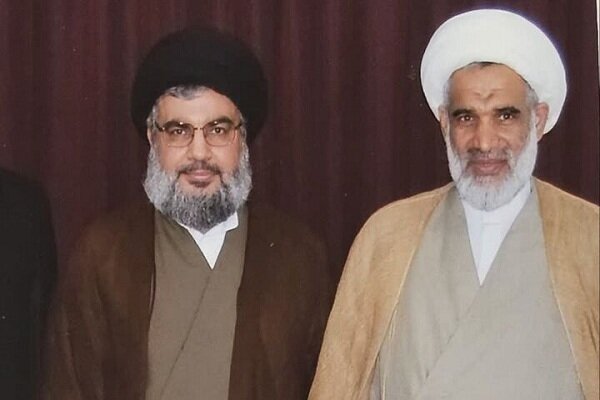Nasrallah through the eyes of an old friend
Ayatollah Ka'bi reflects on the Resistance leader’s life, personality, and legacy

TEHRAN – Ayatollah Abbas Ka'bi Nasab is an influential Iranian cleric and member of the Guardian Council and Assembly of Experts, as well as a respected university professor. He is also a longtime friend of the late Hezbollah leader, Seyyed Hassan Nasrallah.
In an interview with the Tehran Times, the 63-year-old cleric discussed his first acquaintance with Nasrallah, his insights into Nasrallah's personality, and his perspective on the future of Lebanon's Hezbollah movement following the martyrdom of its leader, who was assassinated in September during an unprecedently heavy airstrike by Israel.
Below is the full text of the interview:
When did you first meet the late Nasrallah, and how did your relationship with him evolve?
I traveled to Lebanon in early 1982. From that point on, I was in daily contact with Martyr Nasrallah. I can say that I developed close relationships with him, Martyr Sayyed Abbas Mussawi, and all the individuals who later became the founders of Hezbollah. We became friends even before Hezbollah was officially established as a Resistance organization in Lebanon. Until about a year before his martyrdom, I regularly saw him, assisted him, and maintained constant communication with him. I would travel to Lebanon several times a year and also maintained strong ties with the entire Hezbollah organization.
Throughout the years, I understood that a central element of Martyr Nasrallah's personal dedication was his unwavering allegiance to the Guardianship of the Islamic Jurist and his steadfast belief in the Islamic jurist, both in theory and in practice. At the young age of 22, he received full authorization for religious dues from Imam Khomeini and also maintained an exceptionally close and consistent relationship with Imam Khamenei. In addition, he established extensive connections with the Resistance network throughout the region and even with freedom fighters worldwide.
How do you think the late Nasrallah contributed to the Resistance movement in Lebanon and across the region?
Martyr Sayyed Hassan Nasrallah possessed a profound and unparalleled appeal to a wide range of people within the Islamic Ummah and to freedom fighters around the world. His personality transcended mere charisma. Anyone who listened to his words or spent time with him was drawn to his spiritual and radiant presence, unless their hearts were filled with hatred and animosity towards humanity. People were naturally attracted to Martyr Nasrallah.
His speeches, his sincere emotions, his precise and realistic analyses, and his forward-thinking perspectives – even his predictions about his own martyrdom – served to globalize the message of Resistance. Beyond his public persona and scholarly pursuits, Martyr Nasrallah was an exceptional military strategist. He played a pivotal role in planning and executing extensive military operations against Zionist occupiers, most notably during the 2006 war, known as the July War, which resulted in a victory for Hezbollah. Furthermore, he was a pragmatic and highly skilled politician with a clear vision, who contributed to stabilizing Hezbollah's and Lebanon's power in political negotiations. His crucial role was evident in securing Lebanon's rights in the shared gas fields with the Zionist regime.
Another significant aspect of Martyr Nasrallah's character was his dedication to fighting oppression, pursuing justice, and supporting the underprivileged and oppressed. His approach to social Islam and the creation of a broad network of Hezbollah supporters, known as the Republic of Resistance, was one of his most important contributions. Today, even ordinary members of Hezbollah Lebanon can quickly advance within the organization to positions of leadership. The Hezbollah community is founded on a commitment to resistance, justice, power, solidarity, and securing Lebanon's national and regional interests, as well as those of the Islamic Ummah.
In your opinion, what does the future hold for Hezbollah?
Although the martyrdom of Martyr Nasrallah was a blow, Lebanon’s Hezbollah quickly rebuilt its political and military structure. Today, the spirit of Martyr Sayyed Hassan Nasrallah has been revitalized. Hojjat al-Islam wal-Muslimeen Mr. Naeem Qassem is effectively continuing Martyr Nasrallah's work in both the military and political spheres. He also possesses significant political and military capabilities, as well as charisma. The grand funeral of Martyr Nasrallah also represents a historical milestone in the history of Resistance, both regionally and internationally. Freedom fighters and Resistance movements across the region, and the new generation, will draw inspiration from Martyr Nasrallah's spirit.
The Zionist regime, backed by America, is undoubtedly trying to eliminate Martyr Nasrallah's influence. However, the spirit of resistance he championed has evolved into a vibrant and ever-growing school of thought. Generations have been inspired by Martyr Nasrallah's words, devotion, spirit, and legacy, and these forces will ultimately bring down the Zionist regime.
The Hezbollah in Lebanon has become a self-sufficient organization, structurally, strategically, and in terms of its manpower, logistics, and military capabilities. It has gained such deep social, political, cultural, economic, and defensive roots that it is now inseparable from the Lebanese government, the Lebanese people, and the Lebanese armed forces. Martyr Nasrallah conceived of this interconnectedness as a "golden triangle" of Army, People, and Resistance. The Zionist regime and America are attempting to fracture this triangle by driving a wedge between the army, the people, and the Resistance movement. However, Hezbollah's strategy following Martyr Nasrallah's passing is to reinforce and maintain this crucial bond. This golden triangle provides Hezbollah with internal cohesion and strength, making it, arguably, invincible.
Leave a Comment